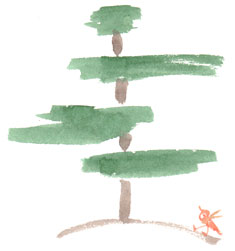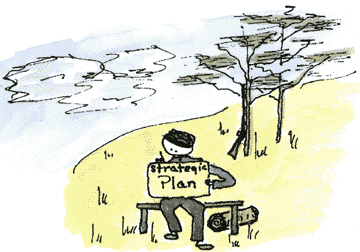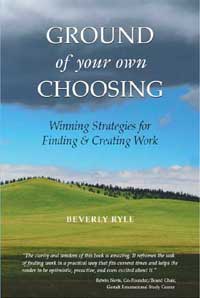Tag
Black Hole
Long ago, I vowed never to write another column about resumes, but something a client said to me a few weeks after being laid off by the Fortune 200 company where she had worked for over fifteen years changed my mind.
"I don’t want anymore black hole resumes," she said emphatically.
For her to be able to speak with such clarity, even while recovering from the shock of being let go, was a cause for celebration. It was a huge step forward because in taking it she was rejecting the idea of another job in favor of work, as a consultant, free agent, business owner.
Go Plant Trees
 I heard some of the best work search advice I've come across in a long time at a career event sponsored by a Boston university where I was invited to give the keynote address.
I heard some of the best work search advice I've come across in a long time at a career event sponsored by a Boston university where I was invited to give the keynote address.
After I spoke, a panel made up of career counselors from the university and a former executive recruiter answered questions from the audience and talked about how they managed their own professional lives.
The former recruiter had recently been elected to a leadership position with a volunteer organization serving professionals under 40 on Cape Cod (a minority here!) and each time she spoke, she would bring up some activity she had participated in with the group.
She talked with unrestrained enthusiasm about spending time the previous weekend, restoring the landscape around one of the Cape's precious kettle ponds, and then she announced:
"If you're looking for a job, go plant trees. You'll probably find yourself digging in the dirt with a bank president or a business owner."
I could barely contain myself!
Resume Magic or Futility?
 Recently I was on my way home from a visit to a friend in Philadelphia, and after I boarded the train at 30th Street Station and settled into my seat, I noticed a man in his mid-fifties across the aisle from me.
Recently I was on my way home from a visit to a friend in Philadelphia, and after I boarded the train at 30th Street Station and settled into my seat, I noticed a man in his mid-fifties across the aisle from me.
His well-dressed, distinguished look suggested to me that he was probably a senior executive en route to an important business meeting in New York, with maybe a round or two of golf or an afternoon of sailing in Long Island Sound on the side.
From the weathered, high-quality leather briefcase beside him on the seat, he took out a thick book entitled, Best Resumes, and with a sigh I added “unemployed or afraid of becoming so” to the description of him I had been forming in my head.
A Conversation with Beverly Ryle II: the Resume
"If you are driving your professional life by an 8 ½ by 11 sheet of paper, you are not doing all you can."
The obsession with the resume means a work-seeker is putting all his eggs in one rather fragile basket and overlooking alternative ways of communicating his value.
Big Returns for Those Wise Enough to Invest
I was once invited to speak to a class of MBA students, and I started my presentation by asking them how much time they devoted to their jobs. The responses ranged between 40 and 50 hours a week. I asked how much time they gave to their studies, and they answered 10 to 20 hours a week. Then I asked how much time they spent managing their careers, and at first there was silence, then nervous laugher. Finally someone said, "Not much."
This was a group of busy, committed professionals who were adding graduate studies to already crowded schedules in the hope of advancing their careers. But they were not doing the spadework necessary to make real progress possible. Even worse, most of the questions they asked me were about relatively minor concerns such as what color stationery was best for resumes!
It's unfortunate that the only thing most people know how to do to take care of themselves professionally is to put together a resume. A resume is a necessary evil, but by itself it won't get you the job you want. It is only a starting point. Its real value is to you, not a prospective employer; in creating a resume you go through the exercise of articulating your selling points, which becomes the cornerstone of everything you do to claim the work you want to do.
Notice that I said, "claim the work you want to do," not "find your next job." This important distinction points out the reason for seeking out career assistance.
Stop Networking
 I am often asked to present at large business gatherings, the kind that offer ample opportunities for networking.
I am often asked to present at large business gatherings, the kind that offer ample opportunities for networking.
Recently at a particularly well attended event, I overheard a woman who was just leaving say with great excitement that she had had a great networking day.
She had come with a hundred business cards and was leaving without a single one!
When I heard this, I couldn't help thinking of all the times I've put my hand in my jacket pocket after one of these events and pulled out a handful of business cards without a clue who the people were or why I thought I'd ever want to talk with them again. They were just names to me.
On the other hand, whenever I've had a real conversation with someone and felt a genuine connection, I've always made a point to get their contact information, even if I had to jot it down on the back of a napkin or a receipt.
Throw Out Your Resume
 A few years ago, I did a full-day workshop on transition for a group of alumni of Bentley College. Right after we finished lunch, just before we started back again, someone expressed frustration with the inefficiency and wastefulness of traditional job-search practices, and I made the offhand remark, “If I had my way, we’d throw out resumes and stop networking.”
A few years ago, I did a full-day workshop on transition for a group of alumni of Bentley College. Right after we finished lunch, just before we started back again, someone expressed frustration with the inefficiency and wastefulness of traditional job-search practices, and I made the offhand remark, “If I had my way, we’d throw out resumes and stop networking.”
It was as if an electric charge went through the room. Thirty business professionals, all of them well-trained in the standard job-search methodologies, came alive. They knew instinctively there had to be a better way.
I’ve often wished I could have put aside the agenda I had planned for the afternoon to pursue the subject with them. What I suspect would have happened is that they would have told me they keep following the standard practices because they don’t know what else to do. The inability to answer the question, “What do I do instead?” is the reason people looking for work keep doing the same old things and expecting different, less frustrating results.
Are You Fighting the Last War?
 In a recent column, I conjured up the vision of an unemployed techie named John. I had him charging up the hill under fire armed with nothing more than a resume and having something less than a fifty-fifty chance of closing with that well-entrenched employer on top.
In a recent column, I conjured up the vision of an unemployed techie named John. I had him charging up the hill under fire armed with nothing more than a resume and having something less than a fifty-fifty chance of closing with that well-entrenched employer on top.
When a person loses his job, or feels threatened by impending layoffs or outsourcing or shaky economic conditions, the most natural thing is to reach for what is most handy—a resume.
But this impulse to reach for the "equipment" and neglect strategic planning is not going to win the battle. It could even undermine the entire offensive.
Same Old Same Old
 Like any other professional, as a career counselor, it's important for me to keep up with what's happening in my field. I do this by reading and studying and talking with thought leaders I respect.
Like any other professional, as a career counselor, it's important for me to keep up with what's happening in my field. I do this by reading and studying and talking with thought leaders I respect.
I also periodically take a look at what the general public is reading by perusing the career shelves of bookstores.
I rarely buy these books because they tend to repeat things I already know and because, in the vast majority of cases, they present an approach I consider to be ineffective and outdated.
Mining Peak Moments
 We've become accustomed to hearing the story of a professional life told almost exclusively in terms of outstanding accomplishments.
We've become accustomed to hearing the story of a professional life told almost exclusively in terms of outstanding accomplishments.
Ask an athlete to reflect on his career and he'll tell you about the time he pitched a no-hitter. Ask an actress and she'll talk about landing the lead in a Tony-winning Broadway play. Ask a writer and he'll recall how it was his third novel that lifted him from obscurity and made him a best-selling author.
These public, universally acknowledged achievements, which everyone recognizes as peak moments, are what we've come to expect when someone looks back on their life.







